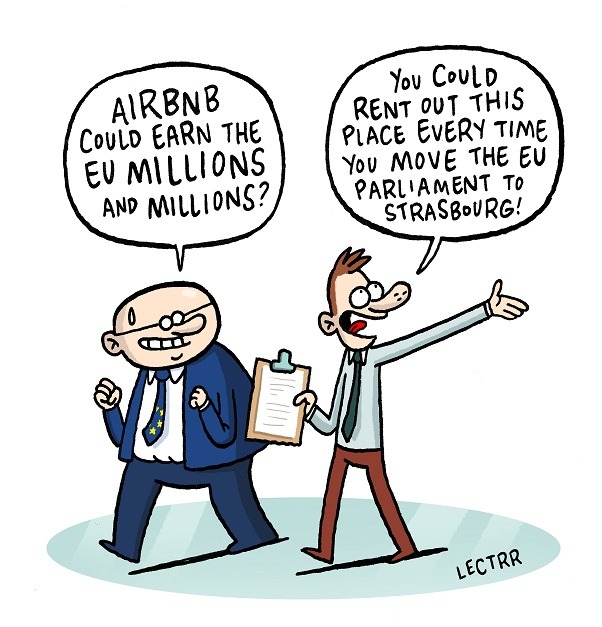Last year I was invited to speak at an event in Amsterdam on the state of the city. The organisers asked me to talk about how globalisation and immigration were affecting European cities and draw lessons for Amsterdam from London’s experience. So I prepared a big-picture, wide-ranging speech about how London had become a global city, with all its advantages (economic dynamism, cultural diversity, great restaurants) and disadvantages (high housing prices, congestion). Which was great – except, as it turned out, the audience were obsessed with a more parochial concern: the proliferation of Airbnb rentals in central Amsterdam, how this was apparently changing the character of the city and pricing out locals, and what needed to be done about it.
Airbnb is wildly popular with both guests and hosts. This online platform, which began in 2008 by matching visitors to San Francisco with local hosts with a spare sofa or bed, has grown into a global accommodation-rental company. Eighty million people booked stays on Airbnb last year. Travellers can choose from more than 3 million listings in over 65,000 locations in nearly 200 countries – including more than 1,000 places in Brussels alone.
Yet Airbnb is increasingly resented by rivals, reproached by residents and restricted by regulators – including in Brussels, where the many layers of Belgian government love to regulate everything, ostensibly for the public good, but often at the behest of established corporate interests. Hotels complain about unfair competition. Tax authorities fret that hosts don’t declare their rental income. Neighbours moan about disruptive guests. City dwellers object that flats that could be rented to locals are instead taken by tourists. And public authorities are responding with all kinds of licensing requirements, regulatory restrictions and even outright bans. But such heavy-handedness is harmful because Airbnb brings many benefits and requires an appropriately light touch.
The onslaught against Airbnb is part of broader backlashes in Europe today. American technology firms are increasingly targeted by European regulators; witness the European Commission’s many antitrust actions against Google. Established companies are seeking to limit competition from dynamic digital newcomers: see how taxi drivers in Brussels rage against Uber drivers who disrupt their cosy cartel. And while the likes of Netflix are hugely popular with their customers, there is also a growing popular revolt against global trends that threaten the settled order of things. Witness the protests against tourism that have broken out in many European cities this summer, from Barcelona to Dubrovnik.
Yet in many ways, Airbnb ought to be much less threatening. While it is growing fast and is valued at some $30 billion (€25 billion), it is hardly a giant like Google or Facebook; last year it accounted for only 4% of hotel stays in Europe and North America and only one euro in every 400 spent on travel accommodation worldwide. Unlike Uber, which seems to revel in an aggressive approach to local regulators and competitors, it takes a much softer stance. Indeed, its recent marketing campaign that celebrated “human kind” (note the play on words) was positively fluffy. And the fact that private individuals are renting out rooms and holiday homes is hardly a novelty; is Airbnb’s facilitation of this really so alarming?
Airbnb provides palpable benefits to both travellers and property owners. For visitors, renting through Airbnb is much more reliable and convenient than doing so through an agency or on the basis of a newspaper advertisement. Its website and search engine make it much easier to find the right place. Mutual ratings establish trust; if you are renting a room, you can be pretty sure that your host is a decent person. Handling online payments and contractual issues limits hassle, disputes and fraud.
For homeowners, Airbnb provides flexible additional income. Anyone can help pay for a holiday by renting out their home while away. For those with rental properties, short-term lets pay more than long-term ones (albeit with additional costs too). The odd horror story about wild parties and wrecked properties make the news only because they are so rare – and Airbnb offers insurance of up to $1 million (€850,000) in damages to hosts.
What is perhaps less recognised are the benefits that Airbnb provides to the economy as a whole. Like other businesses in the “sharing economy”, it enables assets to be used more productively, and thus society to economise on them. In many places, demand for accommodation surges at peak times – for instance, during August in beach resorts, in French cities during the Euro 2016 football championships last year, or when the European Parliament periodically relocates from Brussels to Strasbourg. Instead of having to build many more hotels to meet peak demand – or enabling existing hotels to gouge customers with exorbitant prices, thereby pricing out poorer visitors – Airbnb provides flexible extra supply at lower cost just when it is needed. It also creates jobs in ancillary businesses, such as property management and cleaning.
Given the huge benefits of Airbnb, regulators would do well to tread lightly. To ensure hosts pay the requisite taxes, it is reasonable to insist that Airbnb provide this information to the relevant authorities. But any registration requirements should be quick, easy and low-cost; it is unreasonable to tie up in red tape someone who is merely renting out their home for the holidays. And while fire safety is vital, it would be ludicrous to impose additional burdens on Airbnb rentals: if an apartment is deemed safe to rent out for a year at a time, it is surely safe to rent out for a week at a time too.
While it is legitimate to worry about the impact of tourism on fragile places such as Venice that are mobbed with visitors, Brussels is hardly overwhelmed. And even with all the well-paid professionals who work in and around the EU institutions, property prices in the centre are lower than in many other European cities. Housing more tourists through Airbnb boosts spending in the local economy, thereby creating jobs. By offering a low-cost rental option, it also makes it easier for Europeans to make representations to EU institutions, enhancing democracy too.
Capping Airbnb rentals would be unfairly discriminatory. Brussels would do well not to follow Barcelona’s lead and halt new Airbnb registrations. This policy has entrenched the pricing power of hotels and those with existing licenses. It would be an even bigger blunder to emulate Berlin, which has in effect banned short-term lets to tourists.
While it is true that demand from visitors may push up costs for local tenants, foreigners’ impact is usually exaggerated. In any case, the solution is to build sufficient accommodation, not keep out visitors. And while everyone must obey the law and keep the peace, the right of someone to rent out their property shouldn’t be subject to the whims of their neighbours, who are often simply jealous of others’ good fortune.
Last but not least, there is an important EU single-market principle at stake: if a good or service is legal in one part of the Union, it ought to be legal everywhere. Yet in practice, Airbnb is treated very differently across the Union. In effect, the single market is fragmented along national and local lines.
Last year the European Commission issued recommendations to member states on whether and how to regulate the sharing economy. While its desire to avoid imposing new regulation is laudable, it also needs to defend the single market. Is it really acceptable for Airbnb to be legal in Brussels but, in effect, banned in Berlin? Under EU law, shouldn’t Bruxellois visiting Berlin have the same rights as EU citizens who live there?
By Philippe Legrain


